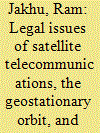| Srl | Item |
| 1 |
ID:
079194


|
|
|
|
|
| Publication |
2007.
|
| Summary/Abstract |
Satellites are the best means for a rapid expansion of telecommunications services nationally and globally. However, the level of that expansion is greatly determined by the availability of the two indispensable tools for satellites, which are orbital positions and radio frequencies. Growing demand for geostationary orbital (GEO) slots and radio frequencies by a rapidly increasing number of commercial satellite operators and expanding dependence on satellites for military purposes give rise to shortage of slots and spectrum to allocate as well as an increase in satellite interference. Concurrently, increasing space activities and anti-satellite (ASAT) tests are generating man-made space pollution, particularly space debris, and consequently are making the use of outer space more expensive and dangerous. The problems shortage of appropriate orbital positions, satellite interference and space debris are serious. Unless resolved in a timely fashion, they would pose significant barriers and dangers to all (civilian, commercial and military) satellites and could result in denial of access to space in practice by all states. This paper first describes the current situation of shortage of GEO positions and increase in satellite interference. Secondly, current international regulatory regime governing the access to and use of these tools has been analyzed with a view to highlight the weaknesses therein. Thirdly, the problem of space debris is discussed with a view to show how difficult it is becoming to carry on space operations and how important and urgent it is to have an appropriate legal regime in place. Finally, a few recommendations are made emphasizing the need for international cooperation in order to strengthen the international regulatory regime so that the required telecommunication services remain readily available to all and outer space remain pollution-free environment to be used for and by all states.
|
|
|
|
|
|
|
|
|
|
|
|
|
|
|
|
| 2 |
ID:
079193


|
|
|
|
|
| Publication |
2007.
|
| Summary/Abstract |
The debate over military uses of space generally and the weaponization of space in particular is as old as the space age itself. Most recently this debate has been re-invigorated in Canada within the context of Ballistic Missile Defence. This article provides an overview of the legal framework governing the use of force in space, concluding that military activity including, in limited circumstance, the use of force, is not prohibited. The article then addresses the policy debate that arises around issues of weaponization, use of force, and space security. It concludes that while the deployment of certain weapons in space and the employment of force in from and through space might be permitted, a comprehensive analysis of the consequences of such decisions is required to ensure the objective of enhanced security will in fact be achieved
|
|
|
|
|
|
|
|
|
|
|
|
|
|
|
|
| 3 |
ID:
079192


|
|
|
|
|
| Publication |
2007.
|
| Summary/Abstract |
The inherent right of self-defense is critical in protecting the United States (U.S.) space network from growing threats. The scope of this right is frequently questioned, and as applied to the space network, raises several questions. To what extent does the right of self-defense extend outside U.S. territory? Is it permissible under this right to defend non-U.S. registered space assets? What is the standard for establishing an "armed attack" in space? Is the intent of the attackers or the scope of the attack relevant in exercising this right in space? In a 2003 case from the International Court of Justice, the Case Concerning Oil Platforms, many of these questions were addressed, not in the context of a space war, but in the context of a factually analogous conflict, the Tanker War of the 1980s. The Oil Platforms case may be a harbinger for an international shift in the interpretation of the inherent right of self-defense in such a manner as to severely limit U.S. military options in response to an attack on it space systems. This is a shift the U.S. must be prepared to counter
|
|
|
|
|
|
|
|
|
|
|
|
|
|
|
|
| 4 |
ID:
079191


|
|
|
|
|
| Publication |
2007.
|
| Summary/Abstract |
For 21st century warfare, space is the unquestioned new high ground for military operations. The United States (U.S.) has relied on satellites for significant support to military operations and activities since Desert Storm in 1991. Indeed, the U.S. enjoys an asymmetric advantage in modern warfare utilizing our space capabilities. States with interests hostile to the U.S. believe that the significant dependence on space assets by the U.S. military could become its "Achilles heel" in future combat operations. What are the legal and policy bases for the U.S. to respond to threats to space systems that provide support to our military forces? Should the U.S. rely on space arms control initiatives to ensure security in space? This Viewpoint analyzes the international space law regime and U.S. National Space Policy framework applicable to the conduct of military space operations and activities, including the use of force in space to protect and defend our satellite networks as well as our military forces
|
|
|
|
|
|
|
|
|
|
|
|
|
|
|
|